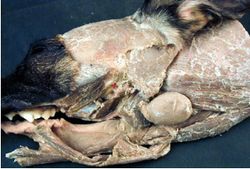Difference between revisions of "Mandibular Gland - Anatomy & Physiology"
Fiorecastro (talk | contribs) |
|||
| (10 intermediate revisions by 4 users not shown) | |||
| Line 1: | Line 1: | ||
| + | [[Image:Parotid & Mandibular Salivary Gland.jpg|thumb|right|250px|Mandibular Salivary Gland - Copyright Nottingham 2008]] | ||
| + | *Mixed gland - [[Serous Salivary Gland - Anatomy & Physiology|serous]] and [[Mucous Salivary Gland - Anatomy & Physiology|mucous]] secretion | ||
==Overview== | ==Overview== | ||
| − | + | ||
| − | The '''mandibular gland''' produces a '''merocrine''' secretion | + | The '''mandibular gland''' produces a '''merocrine''' secretion. It is generally smaller than the '''[[Parotid Gland - Anatomy & Physiology|parotid]]''' gland and is a moderately large gland in carnivores and herbivores. It is compact and located around the angle of the jaw. |
| − | It is generally smaller than the '''[[Parotid Gland - Anatomy & Physiology|parotid]]''' gland and is a moderately large gland in carnivores and herbivores. It is compact and located around the angle of the jaw. | ||
The '''mandibular duct''' runs ventral to the mucous membrane of the floor of the [[Oral Cavity Overview - Anatomy & Physiology|oral cavity]], close to the '''frenulum''' of the [[Tongue - Anatomy & Physiology|tongue]]. The duct opens at the '''sublingual caruncle'''. | The '''mandibular duct''' runs ventral to the mucous membrane of the floor of the [[Oral Cavity Overview - Anatomy & Physiology|oral cavity]], close to the '''frenulum''' of the [[Tongue - Anatomy & Physiology|tongue]]. The duct opens at the '''sublingual caruncle'''. | ||
| Line 13: | Line 14: | ||
==Innervation== | ==Innervation== | ||
| − | The mandibular gland is innervated by the '''facial''' nerve ([[Cranial Nerves - Anatomy & Physiology|CN VII]]) via the '''chordi tympanii''' | + | The mandibular gland is innervated by the '''facial''' nerve ([[Cranial Nerves - Anatomy & Physiology|CN VII]]) via the '''chordi tympanii''' of the '''trigeminal''' nerve ([[Cranial Nerves - Anatomy & Physiology|CN V]]). |
==Species Differences== | ==Species Differences== | ||
| Line 23: | Line 24: | ||
The mandibular gland in herbivores is larger and deeper. | The mandibular gland in herbivores is larger and deeper. | ||
| − | + | ==Links== | |
| − | + | ||
| − | + | '''Test yourself with the [[Oral_Cavity_- Anatomy & Physiology_-_Flashcards#Salivary_Glands_Flashcards|Salivary Gland Flashcards]]''' | |
| − | + | ||
| − | |||
| − | |||
| − | |||
[[Category:Salivary Glands - Anatomy & Physiology]] | [[Category:Salivary Glands - Anatomy & Physiology]] | ||
| − | [[Category: | + | [[Category:To Do - Review]][[Category:To Do - AP Review]] |
| − | [[Category: | ||
Revision as of 10:31, 17 December 2010
Overview
The mandibular gland produces a merocrine secretion. It is generally smaller than the parotid gland and is a moderately large gland in carnivores and herbivores. It is compact and located around the angle of the jaw.
The mandibular duct runs ventral to the mucous membrane of the floor of the oral cavity, close to the frenulum of the tongue. The duct opens at the sublingual caruncle.
Histology
The mandibular gland is known as a tubulo-acinar gland. It consists of mucous cells that stain lighter and serous demilunes that stain darker. Demilunes secrete into lumen by canaliculi between mucous cells.
Innervation
The mandibular gland is innervated by the facial nerve (CN VII) via the chordi tympanii of the trigeminal nerve (CN V).
Species Differences
Carnivores
The mandibular gland produces mainly mucous secretions in the dog and cat. It is an oval shape in the canid.
Herbivores
The mandibular gland in herbivores is larger and deeper.
Links
Test yourself with the Salivary Gland Flashcards
